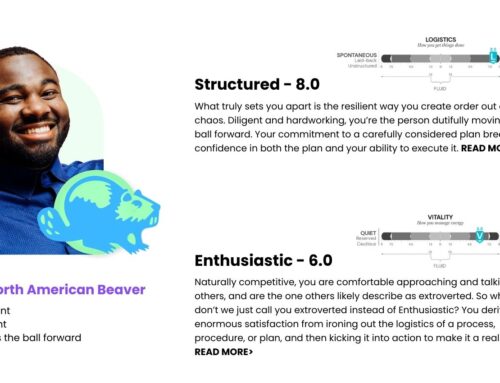The Problem with Personality Assessments
There is a fundamental problem with psychological assessments: the results only represent a snapshot in time. While interesting and sometimes even eye-opening, the assessments and their results don’t really move the needle when it comes to understanding or improving oneself.
To the contrary, most psychologists still maintain that your personality – formed at an early point in life – remains more or less the same for the remainder. That’s news to Benjamin Hardy, PhD, who is widely known as one of the world’s foremost experts in organizational psychology.
In his book, Personality Isn’t Permanent, Hardy tackles what he calls the myths about psychology in general and personality in particular. The notion that what we are is something that can be assessed, scored, and locked down is not only wrong but self-limiting.
Or as Seth Godin puts it, Hardy’s book “will help you unlock a future that you may have been brainwashed into believing wasn’t possible.”
Moving Beyond Assessments
Some assessment services try to get around the traditional fire-and-forget model by delivering a steady stream of content tied to your results. As in, ‘your results say you’re neurotic and while there’s really nothing you can do about it, here are some adjustments you can make to, you know, make yourself less neurotic.’
In other words, you’re still being put in a box, the box is being reinforced, but they’ll help you poke sone extra air holes in the sides to breathe a bit easier.
“You can’t change the past. You can only discover and better understand who you really are and why.” – Benjamin Hardy
Or as Hardy puts it, once your personality is revealed, “you are then enabled to build your entire life around that personality. This life you build may not be the one you’d have chosen for yourself, but it’s the life you were born to live.”
Self-awareness brings with it many, many benefits. But only if the one seeking greater awareness does the work. So rather than reinforcing what you already know, we recommending keeping your assessment results in mind while you take the following steps:
Learn, Learn, Learn
A good, scientific assessment helps start the self-awareness building process by measuring and articulating your inner life while also explaining how the outside world sees you. But to push beyond that, you need to learn about topics related to self-awareness.
Start with self-awareness, which is fast-developing into a cottage industry of its own. But also delve into psychology, behaviorism, cognitive and neuroscience, philosophy, spirituality. The more serious you are about the topic, the more interested you’ll become in these and other topics.
Write It Out
Keep an inventory of your thought patterns and habits as well as your emotional reactions to those thoughts. Try to determine the origins of those emotions and whether there’s anything you can do to downgrade or otherwise control the really strong ones. This mental inventory eventually can help you track any changes or progress in your efforts.
Ask Around
Seek the candid input of a handful of close friends, colleagues, or family members – people you can trust to give you the whole truth and nothing but the truth. Their insights may surprise you since more often than not, others know us better than we know ourselves.
Reassess and Compare
Go back and retake one or more assessments and compare the results to earlier versions. Again, you may be surprised (recognizing that while, say, personality does not change all that much over time, your emotional state might).
Repeat All of the Above
Remind yourself that self-awareness is a journey. Remember, we started this by talking about the limitations of assessments – snapshots in time. So you need to make an ongoing investment in all the above and repeat as often as possible. If you’re disciplined, we’re confident you’ll find real growth and the benefits that come with it.
The Problem with Personality Assessments
There is a fundamental problem with psychological assessments: the results only represent a snapshot in time. While interesting and sometimes even eye-opening, the assessments and their results don’t really move the needle when it comes to understanding or improving oneself.
To the contrary, most psychologists still maintain that your personality – formed at an early point in life – remains more or less the same for the remainder. That’s news to Benjamin Hardy, PhD, who is widely known as one of the world’s foremost experts in organizational psychology.
In his book, Personality Isn’t Permanent, Hardy tackles what he calls the myths about psychology in general and personality in particular. The notion that what we are is something that can be assessed, scored, and locked down is not only wrong but self-limiting.
Or as Seth Godin puts it, Hardy’s book “will help you unlock a future that you may have been brainwashed into believing wasn’t possible.”
Moving Beyond Assessments
Some assessment services try to get around the traditional fire-and-forget model by delivering a steady stream of content tied to your results. As in, ‘your results say you’re neurotic and while there’s really nothing you can do about it, here are some adjustments you can make to, you know, make yourself less neurotic.’
In other words, you’re still being put in a box, the box is being reinforced, but they’ll help you poke sone extra air holes in the sides to breathe a bit easier.
“You can’t change the past. You can only discover and better understand who you really are and why.” – Benjamin Hardy
Or as Hardy puts it, once your personality is revealed, “you are then enabled to build your entire life around that personality. This life you build may not be the one you’d have chosen for yourself, but it’s the life you were born to live.”
Self-awareness brings with it many, many benefits. But only if the one seeking greater awareness does the work. So rather than reinforcing what you already know, we recommending keeping your assessment results in mind while you take the following steps:
Learn, Learn, Learn
A good, scientific assessment helps start the self-awareness building process by measuring and articulating your inner life while also explaining how the outside world sees you. But to push beyond that, you need to learn about topics related to self-awareness.
Start with self-awareness, which is fast-developing into a cottage industry of its own. But also delve into psychology, behaviorism, cognitive and neuroscience, philosophy, spirituality. The more serious you are about the topic, the more interested you’ll become in these and other topics.
Write It Out
Keep an inventory of your thought patterns and habits as well as your emotional reactions to those thoughts. Try to determine the origins of those emotions and whether there’s anything you can do to downgrade or otherwise control the really strong ones. This mental inventory eventually can help you track any changes or progress in your efforts.
Ask Around
Seek the candid input of a handful of close friends, colleagues, or family members – people you can trust to give you the whole truth and nothing but the truth. Their insights may surprise you since more often than not, others know us better than we know ourselves.
Reassess and Compare
Go back and retake one or more assessments and compare the results to earlier versions. Again, you may be surprised (recognizing that while, say, personality does not change all that much over time, your emotional state might).
Repeat All of the Above
Remind yourself that self-awareness is a journey. Remember, we started this by talking about the limitations of assessments – snapshots in time. So you need to make an ongoing investment in all the above and repeat as often as possible. If you’re disciplined, we’re confident you’ll find real growth and the benefits that come with it.



